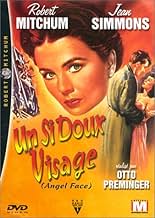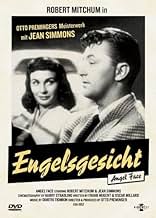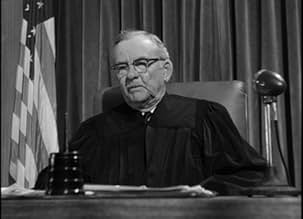Ajouter une intrigue dans votre langueAmbulance driver Frank Jessup is ensnared in the schemes of the sensuous but dangerous Diane Tremayne.Ambulance driver Frank Jessup is ensnared in the schemes of the sensuous but dangerous Diane Tremayne.Ambulance driver Frank Jessup is ensnared in the schemes of the sensuous but dangerous Diane Tremayne.
- Réalisation
- Scénario
- Casting principal
- TV Broadcaster
- (scènes coupées)
- Good Humor Man
- (scènes coupées)
- TV Girl
- (scènes coupées)
- Matron
- (non crédité)
- Waitress
- (non crédité)
- Courtroom Spectator
- (non crédité)
Avis à la une
While the commotion is going on upstairs, ambulance driver Frank Jessup (Robert Mitchum) wanders downstairs and finds the stepdaughter ( her dad is married to the wealthy woman), Diane (Jean Simmons) playing the piano. And that's where the attraction begins on the part of Frank. It's where the obsession begins on the part of Diane. It's where Diane mutters her first double entendre. She asks how her stepmother is, and says "It's so hard, just waiting...". Waiting for her to live, or for her to die?
The film is ultimately a wicked study in obsession - the kind of obsession that has no boundaries - the kind of obsession between a man and a woman - the kind of obsession that is so self-serving. And, interestingly, it is largely one-sided - since Frank may enjoy the delights of Diane, but also knows deep down that she should be put back on the shelf. Diane's obsession is so real that you do basically know that Mitchum's Frank Jessup doesn't really stand a chance.
But Frank wasn't just wandering through life alone when Diane met him. The other woman in Frank's life, played by Mona Freeman, is blonde and desirable. She may be an excellent cook and not ask questions, as Frank says, but there is some stark language for the production code era. He mentions she sleeps in pajamas. He mentions how much she weighs - "stripped". The implication is that Frank may be the free agent that he claims to be, but he has been sleeping with the lady. But she's a lady with a level head, and she is not just going to wait around for Frank to come to his senses - or not. Instead she explores another more dependable romantic possibility.
Let me just say Jean Simmons was a revelation here. She's a good actress but she has always come across as a virginal school marm type in all of the roles I saw her in until this one. I would have never believed she could have played opposite Mitchum's cool, relaxed persona and have made it work, but she did.
This film is dark to the extreme and is as fresh, as vital, and as pertinent as though it were made just yesterday.
I wasn't sure I could believe Robert Mitchum, the king of world-weary sardonic-ism, falling so readily for the youthful charms of evil step-daughter Simmons, especially with a smart, pretty and loving girl of his own, but once I surrendered this point, it was easy, rather like Mitchum's ambulance-driver, to be persuaded to follow the plot here through to the bitter end.
I actually considered both leads to be somewhat miscast in the film, Simmons effect dulled somewhat by a rather ugly helmet of a wig and the dialogue lacks the snap of a Hammett, Chandler or even a Spillane, but the narrative is intriguing and the ambivalent natures of both the main parts strangely compelling, plus, like I said there's a surprise, no make that shock ending, to finish things off with a knockout punch.
Director Preminger mixes up some staple noir elements of a femme fatale, her stooge of a male admirer, sex, murder and mystery, employing big-close-ups, atmospheric lighting and crisply shot monochromatic sets, perhaps only faltering over a slightly dull, over-technical courtroom scene, and the miscasting already mentioned.
Nevertheless, the story crackles along and I doubt many will anticipate the climax, which certainly caught me off-guard and yet in retrospect, delivers a finish true to the genre's often nihilistic traits.
Mitchum of course is naturally very good as the ensnared Frank, the piano-playing Simmons, dressed throughout in black and white outfits, perhaps stressing the duality of her nature, a little less so.
Le saviez-vous
- AnecdotesAfter Robert Mitchum got fed up with repeated re-takes in which director Otto Preminger ordered him to slap Jean Simmons across the face, he turned around and slapped Preminger, asking whether it was this way he wanted it. Preminger immediately demanded of producer Howard Hughes that Mitchum be replaced. Hughes refused. (Mitchum starred in Preminger's "River of No Return" two years later.)
- GaffesAfter Diane insists on paying for dinner, Frank declines her offer, noting that he can afford it even on his salary. He takes out his wallet and places money on the table. Diane then later says, "At least let me pay for my half." He obliges. She takes out her purse and gives him some cash. Frank then picks up the money he had put down (which would have covered the full bill), puts her money (covering half the bill) down in its place, and gives her all of his money, which she puts in her purse. Nobody ends up paying for Frank's half and Diane ends up with more money than she started with.
- Citations
Frank Jessup: [of Diane's 'evil' stepmother] ... If she's tryin' to kill you, why did she turn on the gas in her own room first?
Diane Tremayne: ...To make it look as though somebody else were guilty...
Frank Jessup: Is that what you did?
Diane Tremayne: Frank, are you accusing me?
Frank Jessup: I'm not accusing anybody. But if I were a cop, and not a very bright cop at that, I'd say that your story was as phony as a three dollar bill.
Diane Tremayne: ...How can you say that to me?
Frank Jessup: Oh, you mean after all we've been to each other?... Diane, look. I don't pretend to know what goes on behind that pretty little face of yours - I don't *want* to. But I learned one thing very early. Never be the innocent bystander - that's the guy that always gets hurt. If you want to play with matches, that's your business. But not in gas-filled rooms - that's not only dangerous, it's stupid.
- ConnexionsFeatured in She Devil (1957)
- Bandes originalesI Couldn't Sleep a Wink Last Night
(uncredited)
Music by Jimmy McHugh
Heard as source music instrumental in Harry's Café
Meilleurs choix
- How long is Angel Face?Alimenté par Alexa
Détails
Box-office
- Budget
- 1 039 000 $US (estimé)
- Durée
- 1h 31min(91 min)
- Couleur
- Rapport de forme
- 1.37 : 1




































